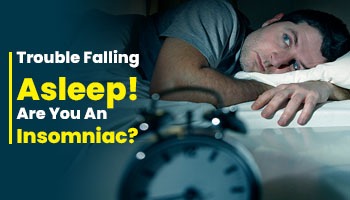Trouble Falling Asleep! Are You An Insomniac?
Jan 20, 2022
Getting a good sleep is a pipe dream of youth nowadays, not getting enough sleep can cause an array of issues and diseases. You'll find a lot of advice around improving your quality of sleep and adopting healthy sleep routines, some of which may work for different people. Some people are actually lighter sleepers or take longer to drop off, while some life circumstances might make it more likely for your sleep to be interrupted, like stressful events, long tiring days etc.. They might also find it difficult to concentrate during the day because they are tired, or wake up early and not be able to go back to sleep.
According to the National Institute for Health, insomnia can increase your risk for mental health problems as well as overall health concerns. Over time, untreated insomnia may raise your risk of certain health problems or workplace or road accidents. Complications of insomnia may include:-
-Lower performance on the job or at school
-Slowed reaction time while driving and a higher risk of accidents
-Mental health disorders, such as depression, an anxiety disorder or substance abuse
-Increased risk and severity of long-term diseases or conditions, such as high blood pressure and heart disease
The main symptom of insomnia is trouble falling or staying asleep, even if you have enough time and the right conditions for good sleep. So, if you have insomnia, it may include :-
-Difficulty falling asleep at night
-Waking up during the night
-Waking up too early
-Not feeling well-rested after a night's sleep
-Daytime tiredness or sleepiness
-Irritability, depression or anxiety
-Difficulty paying attention, focusing on tasks or remembering
-Increased errors or accidents
-Ongoing worries about sleep
Try not to get anxious about your sleep troubles, as worrying about insomnia will make sleep less likely. These good sleeping habits can cure insomnia at home and promote sound sleep:-
-Keep your bedtime and wake time consistent from day to day, including weekends.
-Stay active — regular activity helps promote a good night's sleep.
-Check your medications to see if they may contribute to insomnia.
-Avoid or limit naps.
-Avoid or limit caffeine and alcohol, and don't use nicotine.
-Avoid large meals and beverages before bedtime.
-Make your bedroom comfortable for sleep and only use it for sex or sleep.
-Create a relaxing bedtime ritual, such as taking a warm bath, reading or listening to soft music.
Other treatments :- Your doctor may recommend that you use light therapy to set and maintain your sleep-wake cycle. With this treatment, you plan time each day to sit in front of a light box, which produces bright light similar to sunlight.
A healthy body states :- Most people experience problems with sleep in their life. In fact, it's thought that every third person existing will surely have episodes of insomnia.
Recent Post

BlueMedix: Your One-Stop Solution for Medicines and Medical Services all under one roof

WINTERS NEED SPECIAL CARE!

Winter Hair Care Tips

Why is health devices necessary at home?

Why do you need to stay hydrated especially in summer?
The Leading Opportunity

Supplements for weight loss: Do they really work & are they safe to use?

Stop self-diagnosing: 5 reasons to see a doctor instead.

STATEWISE UPDATES ON THE NEW VARIANT

Online Medicine Delivery in Patna

